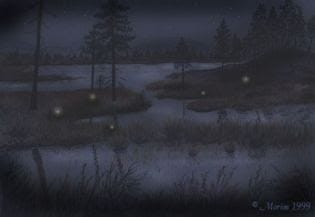Ignes fatui

One of the reasons I like reading the classics is because of the use of language, and the new words to be discovered, and what the books teach about life and character. Here is one such new word that I discovered in Jane Eyre some time ago, and recently re-discovered the computer file I made of it.
So many things in this world are nothing but ignes fatui (eg 1 Timothy 6:9-10).
.... and it is madness in all women to let a secret love kindle within them, which, if unreturned and unknown, must devour the life that feeds it; and, if discovered and responded to, must lead, ignis-fatuus-like, into miry wilds whence there is no extrication.
Jane Eyre, Charlotte Bronte
ignis fatuus
SYLLABICATION: ig•nis fat•u•u
NOUN: Inflected forms: pl. ig•nes fat•u•i
1. A phosphorescent light that hovers or flits over swampy ground at night, possibly caused by spontaneous combustion of gases emitted by rotting organic matter. Also called friar's lantern, jack-o'-lantern, will-o'-the-wisp, wisp.
2. Something that misleads or deludes; an illusion.
ETYMOLOGY: Medieval Latin : Latin ignis, fire + Latin fatuus, foolish. (From dictionary.com.)
Ignis fatuus (Medieval Latin, 'foolish fire'). The will o' the wisp or friar's lanthorn, a flame-like phosphorescence (caused by the spontaneous combustion of gases from decaying vegetable matter) that flits over marshy ground and deludes people who attempt to follow it. Hence any delusive aim or object, or some scheme that is utterly impracticable. It is also known by a number of other names, such as elf-fire, jack-o'-lantern, peg-a lantern, kit o' the canstick, spunkie, walking fire, fair maid of Ireland and John in the wad. (See Henry IV Part 1 III iii,).
(According to Russian folklore these wandering fires are the spirits of stillborn children, which flit between heaven and the Inferno.)
Brewer's Dictionary of Phrase and Fable, Sixteenth Edition, Revised by Adrian Room.

